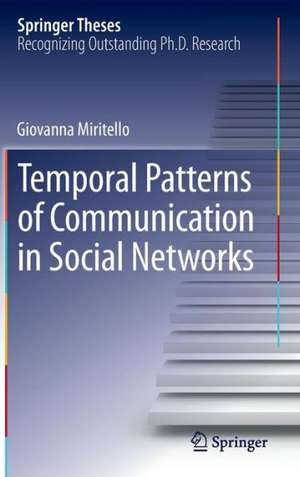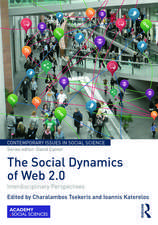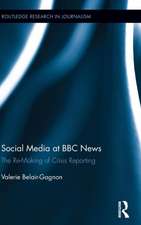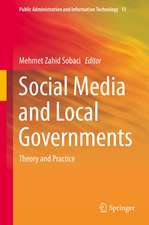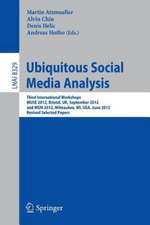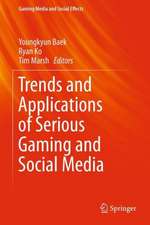Temporal Patterns of Communication in Social Networks: Springer Theses
Autor Giovanna Miritelloen Limba Engleză Hardback – 3 iun 2013
| Toate formatele și edițiile | Preț | Express |
|---|---|---|
| Paperback (1) | 634.18 lei 43-57 zile | |
| Springer International Publishing – 24 iun 2015 | 634.18 lei 43-57 zile | |
| Hardback (1) | 640.24 lei 43-57 zile | |
| Springer International Publishing – 3 iun 2013 | 640.24 lei 43-57 zile |
Din seria Springer Theses
- 18%
 Preț: 997.88 lei
Preț: 997.88 lei -
 Preț: 389.88 lei
Preț: 389.88 lei - 15%
 Preț: 646.94 lei
Preț: 646.94 lei - 18%
 Preț: 943.43 lei
Preț: 943.43 lei -
 Preț: 399.29 lei
Preț: 399.29 lei - 18%
 Preț: 944.99 lei
Preț: 944.99 lei - 15%
 Preț: 636.80 lei
Preț: 636.80 lei - 18%
 Preț: 941.05 lei
Preț: 941.05 lei - 15%
 Preț: 643.16 lei
Preț: 643.16 lei - 15%
 Preț: 642.68 lei
Preț: 642.68 lei - 18%
 Preț: 1103.62 lei
Preț: 1103.62 lei - 20%
 Preț: 558.82 lei
Preț: 558.82 lei - 18%
 Preț: 1112.30 lei
Preț: 1112.30 lei - 18%
 Preț: 944.19 lei
Preț: 944.19 lei - 18%
 Preț: 1109.92 lei
Preț: 1109.92 lei - 18%
 Preț: 1217.27 lei
Preț: 1217.27 lei - 15%
 Preț: 640.06 lei
Preț: 640.06 lei - 15%
 Preț: 636.45 lei
Preț: 636.45 lei - 15%
 Preț: 640.06 lei
Preț: 640.06 lei - 15%
 Preț: 640.88 lei
Preț: 640.88 lei -
 Preț: 389.70 lei
Preț: 389.70 lei - 20%
 Preț: 563.89 lei
Preț: 563.89 lei -
 Preț: 393.35 lei
Preț: 393.35 lei - 15%
 Preț: 637.93 lei
Preț: 637.93 lei - 15%
 Preț: 641.85 lei
Preț: 641.85 lei - 18%
 Preț: 1225.94 lei
Preț: 1225.94 lei - 20%
 Preț: 551.36 lei
Preț: 551.36 lei - 18%
 Preț: 1229.10 lei
Preț: 1229.10 lei - 15%
 Preț: 639.25 lei
Preț: 639.25 lei - 18%
 Preț: 999.45 lei
Preț: 999.45 lei - 15%
 Preț: 640.06 lei
Preț: 640.06 lei - 18%
 Preț: 1220.45 lei
Preț: 1220.45 lei - 18%
 Preț: 1116.26 lei
Preț: 1116.26 lei - 18%
 Preț: 1110.72 lei
Preț: 1110.72 lei - 18%
 Preț: 1000.87 lei
Preț: 1000.87 lei - 18%
 Preț: 891.17 lei
Preț: 891.17 lei - 15%
 Preț: 640.06 lei
Preț: 640.06 lei - 5%
 Preț: 1154.07 lei
Preț: 1154.07 lei - 15%
 Preț: 635.96 lei
Preț: 635.96 lei - 15%
 Preț: 640.88 lei
Preț: 640.88 lei -
 Preț: 387.20 lei
Preț: 387.20 lei - 18%
 Preț: 1109.92 lei
Preț: 1109.92 lei -
 Preț: 385.25 lei
Preț: 385.25 lei -
 Preț: 385.25 lei
Preț: 385.25 lei - 18%
 Preț: 1112.30 lei
Preț: 1112.30 lei - 18%
 Preț: 999.45 lei
Preț: 999.45 lei -
 Preț: 386.99 lei
Preț: 386.99 lei - 15%
 Preț: 637.13 lei
Preț: 637.13 lei - 20%
 Preț: 554.20 lei
Preț: 554.20 lei - 20%
 Preț: 555.57 lei
Preț: 555.57 lei
Preț: 640.24 lei
Preț vechi: 753.22 lei
-15% Nou
Puncte Express: 960
Preț estimativ în valută:
122.51€ • 128.23$ • 101.97£
122.51€ • 128.23$ • 101.97£
Carte tipărită la comandă
Livrare economică 31 martie-14 aprilie
Preluare comenzi: 021 569.72.76
Specificații
ISBN-13: 9783319001098
ISBN-10: 3319001094
Pagini: 168
Ilustrații: XIV, 153 p.
Dimensiuni: 155 x 235 x 15 mm
Greutate: 0.41 kg
Ediția:2013
Editura: Springer International Publishing
Colecția Springer
Seria Springer Theses
Locul publicării:Cham, Switzerland
ISBN-10: 3319001094
Pagini: 168
Ilustrații: XIV, 153 p.
Dimensiuni: 155 x 235 x 15 mm
Greutate: 0.41 kg
Ediția:2013
Editura: Springer International Publishing
Colecția Springer
Seria Springer Theses
Locul publicării:Cham, Switzerland
Public țintă
ResearchCuprins
Introduction and Motivation.- Social and Communication Networks.- Social Strategies in Communication Networks.- Predicting Tie Creation and Decay.- Information Spreading on Communication Networks.- Conclusion, contributions and vision for the future.- Data and Materials.
Textul de pe ultima copertă
The main interest of this research has been in understanding and characterizing large networks of human interactions as continuously changing objects. In fact, although many real social networks are dynamic networks whose elements and properties continuously change over time, traditional approaches to social network analysis are essentially static, thus neglecting all temporal aspects. Specifically, we have investigated the role that temporal patterns of human interaction play in three main fields of social network analysis and data mining: characterization of time (or attention) allocation in social networks, prediction of link decay/persistence, and information spreading. In order to address this we analyzed large anonymized data sets of phone call communication traces over long periods of time. Access to these observations was granted by Telefonica Research, Spain. The findings that emerge from our research indicate that the observed heterogeneities and correlations of human temporal patterns of interaction significantly affect the traditional view of social networks, shifting from a very steady to a highly complex entity. Since structure and dynamics are tightly coupled, they cannot be disentangled in the analysis and modeling of human behavior, though traditional models seek to do so. Our results impact not only the way in which social network are traditionally characterized, but more importantly also the understanding and modeling phenomena such as group formation, spread of epidemics, and the dissemination of ideas, opinions and information.
Caracteristici
Nominated by Universidad Carlos III de Madrid as an outstanding Ph.D. thesis Reveals new and unexpected features of how complex social networks develop over time Based on data mining of massive records of telephone connections Includes supplementary material: sn.pub/extras
